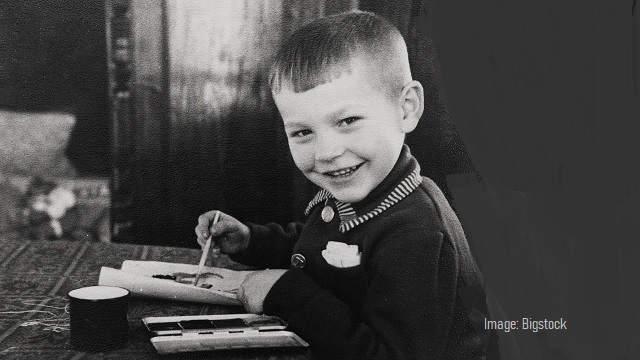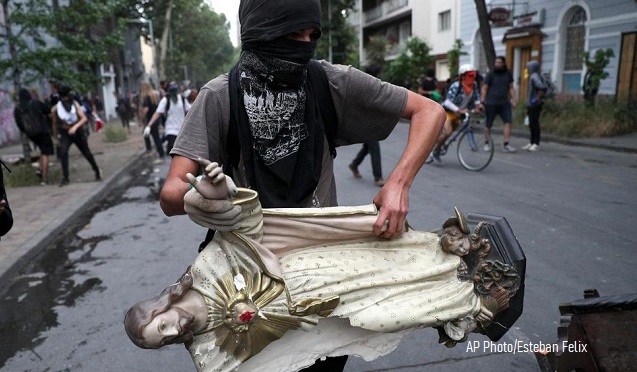A Child’s-Eye View of Communism’s Absurdities

Candid childhood memories of life behind the Iron Curtain
It is a truism to say that children have a grasp of reality different from adults; a clearer and more honest grasp that in most cases they lose with maturity. Rare is the man or woman who retains that innocent capacity to see through grown-up hypocrisy and pretence, presented to us so vividly in Hans Andersen’s memorable fairy-tale, The Emperor’s New Clothes.
In this humorous memoir of growing up in a city (unidentified) of 40,000 in the southern Urals of the Soviet Union in the 1970s-1980s, Fr Alexander Krylov, of Russian-German origin, manages to retain the undeceived eyes of childhood as he relates the absurdities and contradictions of life under Communism.
God and family
So many memoirs of living under the Soviet regime are, understandably, riven with bitterness and anger; the suffering has been too great to forget. The young Krylov, an only child, was protected from this by the love and faith of his family: his Catholic mother and grandmother and his Orthodox father.
The latter died when he was aged seven; showing unusual understanding for his age, Krylov realised that he was now “the one man in the family.” A certain independence of outlook seems to have characterised him from the start — probably because, despite the constant atheist propaganda impressed on him at school and in the wider society, “God’s presence in everyday life was… self-evident for our family.”
Much of this was owing to his grandmother’s influence for, as the family breadwinner, his mother had to work long hours outside the home. This grandmother, who had grown up in a German-speaking colony in Russia, resembled a traditional Russian “babushka” in her fortitude, her generosity and her strong faith that years of living in Leonid Brezhnev’s decrepit Soviet society could not erase.
In this world, all its citizens were officially atheist yet, as Krylov relates, everyone in his neighbourhood “knew” who the believers were and what religion they followed. His grandmother “saw an ally in every human being who was seeking God — Jews, Orthodox and Muslims” because — especially in death — “common prayer was much more important than any disagreement.”
There were no churches in his city and he only saw the inside of an Orthodox church (in western Ukraine) before starting school, aged six. Overwhelmed by its icons, candles and awe-inspiring atmosphere, Krylov told his mother, “Let’s stay here forever.” Undeterred, his grandmother erected a homemade altar in their small apartment, with its holy pictures, holy water, hymns and secret celebrations of the great Christian feasts. A candle would be lit in the window at Christmas; it was “somehow implicitly clear that God does not abandon human beings as long as a light is burning in at least one window on Christmas Eve and at least one person is waiting for the Christ-child.”
Economic woes
The author takes a gentle swipe at western society, obsessed with dietary fashions, when he explains, in a chapter titled “Healthy Diet”, why Soviet citizens had no choice but a healthy diet. Trying to survive in a corrupt and inefficient command economy, almost all families had an allotment with fruit trees and vegetables, to compensate for what they could not buy in the shops: everything possible was pickled, canned, stored or preserved. For some reason chickens were plentiful:
“Thanks to the poor work of the chemical industry, they were raised with no additives and usually looked as though they had walked by themselves from the chicken factory to the grocery store.”
I laughed aloud as I read this and other reminiscences, narrated in the candid way of a man who has not lost the artless gaze of a child. (After a distinguished academic career in Moscow, Fr Krylov decided to become a priest aged 42, on Easter Monday 2011 and was ordained in 2016.)
Another anecdote describes how he briefly worked in a grocery store where the shelves were often lacking common items buyers craved. Organising the shop’s store room, he noticed many such items, piled them on a trolley and wheeled it through into the shop, to the delighted surprise of the customers. The teenage boy could not understand why the manageress looked so discomfited and why his employment was suddenly curtailed.
Inner life
Just as the late Russian poet, Irina Ratushinskaya, who spent four years in the Gulag for writing “subversive” poetry, commented she was told so often as a child “there is no God”, that she began to believe in Him, Krylov reflects: “The prohibition against owning a Bible in the Soviet Union could only confirm its importance.”
In a telling incident in his teens, he describes a classroom meeting where these young Soviet citizens planned “to put socialist democracy into action.” This meant denouncing a fellow student who would not obey the rules. Krylov, who had befriended him, defended him in front of his classmates. They then turned on him, aware that he too was somehow “different.” The author comments, “Although I was always present, I lived my own life”. This hidden, inner life, which they sensed though it was never made explicit, presented an existential threat to his fellow student ideologues.
Inevitably, Lenin’s image was everywhere. Joining the Communist youth group, the Young Pioneers, one wore a red neckerchief and star. “Depicted on this star were the head of Lenin and three tongues of fire. I shared with no one my impression that this star depicted the head of Lenin burning in hell.” This was the response of a child whose private faith, never mentioned in class, helped to protect him against the atheism he was forced to listen to in public.
Finally, aged 15, overhearing the jocular remark of a friend’s father that vodka was “opium for the people”, Krylov comments: “Suddenly my eyes were opened: [I realised that] Communism had simply become a new religion.”
If the Emperor in this case was not exactly naked, nonetheless the short, discrete chapters of this kindly memoir remind readers that his clothes were uncomfortable, unsuitable, ill-fitting and threadbare.
This review has been republished with the author’s permission from The Conservative Woman.
AUTHOR
Francis Phillips
EDITORS NOTE: This MercatorNet column is republished with permission. ©All rights reserved.

